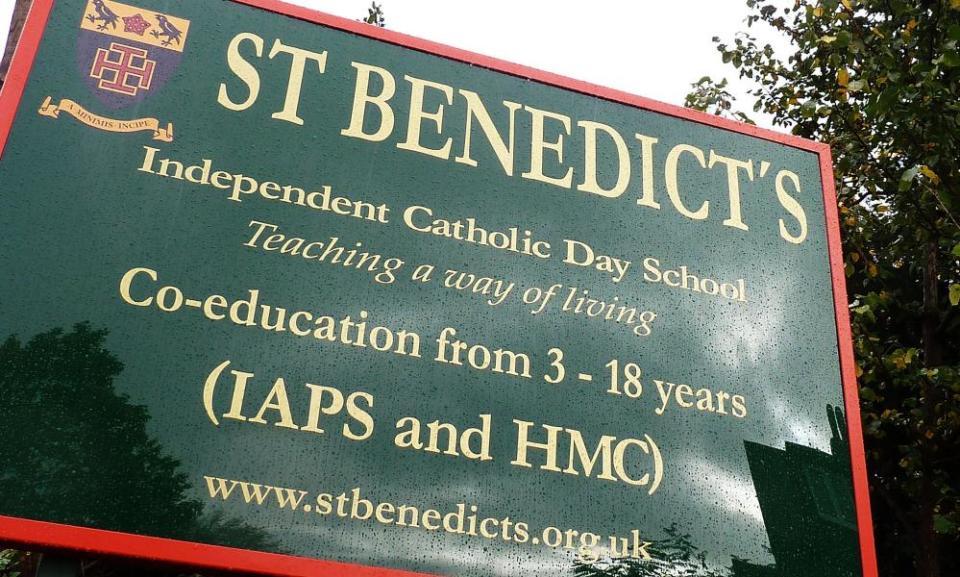Head of Catholic order failed to tell police of sexual abuse at London school

The head of one of the country’s most powerful Catholic orders was made aware of sex abuse allegations dating back to the 1970s at one of its schools but did not alert the authorities – contrary to the recommendations of a church commission on which he sat.
The wide-ranging Independent Inquiry Into Child Sexual Abuse has been shown a handwritten document compiled by Abbot Richard Yeo, who as president of the Benedictines conducted an inquiry at St Benedict’s School in Ealing, west London, in June 2010 following reports that there had been widespread abuse of pupils by teachers and monks.
The year before Yeo’s visit, Father David Pearce, the former head of the junior school, had been jailed for eight years – reduced to five on appeal –after being found guilty of abusing five boys over a 36-year period.
According to notes Yeo took when he visited St Benedict’s, and which will soon be uploaded on to the inquiry’s website, many at the school had been concerned about Pearce decades before he was jailed. Yeo’s notes state: “Mid 70s knew David engaged in dubious activities.” Another monk told him: “Knew since I was junior school head there was something wrong. Graffiti ‘Fr David is bent’.” A third said he was aware of rumours of abuse when he arrived 25 years ago, and expressed disbelief that a former abbot claimed to Yeo he “never knew anything about it”.
The Catholic church’s failure to confront systemic clerical sexual abuse was acknowledged last week at an unprecedented summit on the issue opened by Pope Francis, attended by 180 bishops and cardinals. “The holy people of God are watching and expect not just simple and obvious condemnations, but efficient and concrete measures to be established,” he warned.

Yeo, who stood down as president of the Benedictines in 2017, told the inquiry he did not pass his 2010 notes on to the police because Pearce had already been jailed and that he did not know if they had any evidential value.
But Richard Scorer, specialist abuse lawyer at Slater & Gordon, who is representing several of the victims at the school, and referred to Yeo’s note in a blogpost, said it was not for the abbot to determine what was relevant to the inquiry. He described Yeo’s failure to share his notes with the police as remarkable given that he had been a member of the 2007 Cumberlege commission, the Catholic church’s review of its child safeguarding policies in England and Wales.
“The Cumberlege commission report from 2007 is clear that ‘all allegations of abuse are required to be reported to the statutory authorities who must decide whether a statutory investigation is required,’” Scorer said. “Yeo was a member of this commission, yet when allegations of abuse came into his possession in 2010 he failed to follow the Cumberlege commission’s own rules and report them to the statutory authorities. This demonstrates yet again that senior figures in the Catholic church are happy to ignore the church’s own rules when it suits them and self-policing in the Catholic church always fails.”
Jonathan West, the father of a former pupil, who was instrumental in raising concerns, said repeated failure to investigate abuse at the school highlighted the need for mandatory reporting, which would require all staff working with children to report concerns about the welfare of a child to the local authority.
Father David Pearce would line the boys up naked after swimming to feel them in order to check they were dry
Katherine Ravenscroft
“Mandatory reporting would make it almost impossible for a long-running situation such as occurred at St Benedict’s to happen,” West said. “First, there will inevitably be a greater climate of awareness making reporting more likely. And second, no head teacher is going to risk being prosecuted for suppressing a report of somebody else abusing. These two factors will make it extremely dangerous for abusers to operate in schools. They won’t dare. Abuse will be prevented as a result.”
The inquiry has heard that there were numerous warning signs which should have triggered intervention.
Katherine Ravenscroft, a drama teacher, said that when she joined the school in 1990, “it was spoken about quite freely among the boys in the school that Father David Pearce would oversee swimming while they were in the junior school and that he would line the boys up naked after swimming to feel them in order to check that they were dry”.
Ravenscroft told the inquiry in a statement now published on its website that there were also rumours about Abbot Laurence Soper – who was convicted in 2017 of 19 charges of rape and other sexual offences against 10 boys at the school.
Ravenscroft raised her concerns with police the same year. When she told the new headmaster, Christopher Cleugh, that she wished she had reported the concerns about Pearce earlier, she said he responded: “You can rest assured he will seek absolution for his sins.”
Ravenscroft said it seemed child protection at the school was not taken seriously until its deputy head master, Peter Allott, was sentenced in 2016. “It still seemed as if things were being brushed to one side,” she said in her statement.
Penny Jones, a deputy director of the independent education and school governance division in the Department for Education, said in 2010 ministers were alarmed to learn monks who had committed sexual offences were still living in Ealing Abbey next to the school. “We lacked the powers necessary to require the abbot to remove monks who had offended from the abbey, as the power to remove monks fell [outside] DfE’s jurisdiction,” Jones told the inquiry.

 Yahoo News
Yahoo News 